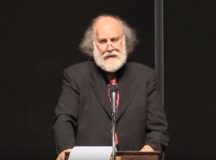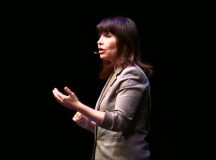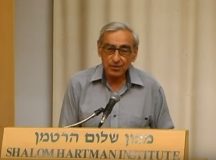Perry Anderson’s Theological Anti-Zionism
Editorial introduction to the Symposium: Perry Anderson’s long essay, ‘The House of Zion’, was published in the November-December 2015 issue of New Left Review, the ‘flagship journal of the Western Left’. Fathom invited Shany Mor, Cary Nelson, John Strawson, Michael Walzer, Mitchell Cohen and Einat Wilf to respond to Anderson’s essay.
Available online, and given the status of an NLR ‘Editorial’, it was the Marxist equivalent of a Papal edict. Anderson was the journal’s long-time editor, and is perhaps the most gifted intellectual historian of his time, author of Lineages of the Absolutist State, Passages from Antiquity to Feudalism, Considerations on Western Marxism, English Questions, The Origins of Postmodernity, and more. In this outing, Anderson serves as episcopus servus servorum Dei, or, the servant of the servants of God (in this case a secular God). Over 14,000 words, he excommunicates the two-state solution to the Israeli-Palestinian conflict and anoints an alternative: ‘the demand for one state is now the best Palestinian option available.’
Anderson’s essay is a summa of the thinking of the Left that has lost its way on the question of Israel. For one thing, his proclamation proceeds untouched by the categories with which classical Marxism has traditionally approached unresolved national questions: ‘internationalism’, ‘chauvinism’, ‘peace between nations’, ‘people’, ‘class’, ‘consistent democracy’, ‘the right to national self-determination’, ‘minority rights’, and ‘federalism’. Instead he prefers the decidedly non-Marxist categories of ‘the Arab states’, ‘their traditional enemy’, the homeland’, ‘the West’, ‘Arab turbulence’, ‘the Zionists’, ‘the Resistance’ and ‘the New World Order’.
Anderson’s dream that the ‘strategic emplacements’ of the Arab states will end the existence of Israel is a far cry from the Marxism of Lenin, who believed national self-determination and consistent democracy was the way to ‘clear the decks for the class struggle’; from the sophisticated discussions of the national question, the rights of peoples, and the mechanics of federalism of the first four congresses of the Communist Third International; and from Trotsky’s late support of the Jewish people’s right to survival as a nation and to live as a ‘compact mass’. In place of all that, conspiracism is passed off as sophisticated geopolitics, class politics is bracketed ‘for the duration’, and fascistic political forces are embraced as ‘the resistance’.
*
Shany Mor argues that Perry Anderson’s essay sets out the three fundamental principles and the two methodological commitments of Theological anti-Zionism [TAZ], as adapted for the post-Cold War and post-9/11 era.
Part 1: The Three Founding Principles of Theological Anti-Zionism
The anti-Zionist theology rests on three foundations, to which I will assign numbers for reference. In TAZ, (1) Palestinian Arabs have no agency of any kind. Moreover, (2) Arab and Muslim antisemitism can be acknowledged as existing only and ever as a reaction, never as a phenomenon with any explanatory or causal power of its own. Finally, (3) the Israelis (and, occasionally when the writer is not cautious, the Jews) are the inheritors of guilt from an original sin which taints anything they might do and anything they might otherwise be.
You can go through his essay and code each of Anderson’s more inflammatory claims according to which foundation or combination thereof they rest on. The margins of my copy of the essay filled up with 1’s, 2’s, and 3’s in almost equal quantities.
Palestinian Arabs have no agency
Palestinian agency isn’t just denied on the big questions, as when Anderson dismisses the entire Palestinian Authority (PA) as puppets of Israel and the West. It pervades his retelling of even the small points, occasionally even when it contributes nothing to his argument. He notes that it took ‘a dozen years’ for per capita income to return to its pre-Second Intifada levels (1), but never asks (much less answers) whether the very popular Palestinian decision to reject Barak’s offer of statehood at Camp David and Clinton’s offer a few months later, and to opt instead for a suicidal cult of terror leading to inevitable defeat, was a wise decision. The Palestinians of 2000 not only threw away the potential for statehood with that course of action, they also sacrificed all that had been gained in the Oslo years — a government that issued its own stamps and passports, ran its own international airport, and ruled over nearly the entire Arab population of both the West Bank and Gaza in the first national Palestinian Arab government ever in history. Was this a wise decision at the time? Given what we know now, does it still seem wise? Does the fact that not even a minority dissenting voice to criticise it can be found 16 years later, despite all the destruction it wrought, indicate something? For Anderson these questions are uninteresting. To ask them would be to attribute agency — even straitened, limited, partial — to the Palestinians, and this would be a violation of the first principle of TAZ.
Muslim or Arab antisemitism is only blowback
Similarly, the total rejection of Israel by the Arab states and Arab publics and the violent and murderous antisemitism animating so much of the self-destructive Arab approach to the conflict with Israel barely merit a mention, except occasionally as an effect rather than cause of anything. Hamas is a ‘principled opponent of Israel,’ not an organisation openly dedicated to genocide, and it is ‘ostracised for refusing to reject armed resistance’ (2) rather than bringing ruin upon its captive population because it would rather save for itself the option of firing missiles at Israeli cities than govern the first contiguous Palestinian enclave free of any foreign (Turkish, British, Jordanian, Egyptian, or Israeli) presence.
Israeli Original Sin
The Israelis, of course, are the inheritors of an ‘enormity of plunder … seized by the conqueror’ (3), and their apparent omertà is only rarely broken by, for example, ‘one of the finest reflections of any Jewish thinker on this history.’ Just as baptised Jews could be useful in ‘exposing’ the machinations of their ex-coreligionists (and co-conspirators), their modern counterparts are relied upon in a long footnote listing all the instantiations of outsized Jewish power in the US, attributed to ‘loyalist Peter Beinart.’ I confess I read that part of the essay several times and I am still not sure what loyalist is supposed to mean here. As for the exhaustive list — Jews in the cabinet, the Congress, the Ivy Leagues, the New York Times, the Supreme Court — I’m pretty sure I know exactly what that’s supposed to mean.
Part 2: The Two Methodological Commitments of Theological Anti-Zionism
Together with its three founding principles, TAZ has two methodological commitments, and Anderson relies heavily on both. For simplicity’s sake, I will designate these with letters rather than numbers. The principal methodological commitment is to (A) the self-proving evil of Israel and the Israelis. The historiographical method will be familiar to anyone who has encountered TAZ in the past. First, Israeli malevolence is postulated and every event refracted through this assumption. Then, this distorted chain of events is used to prove the malevolence upon which it was originally predicated. QED. Furthermore, in any serious work written in the TAZ tradition, (B) the motives, fears, and constraints of Jews and Zionists don’t count for much either, as the latter are only cartoonish villains.
Anderson is particularly wedded to (A). Is Israel reluctant to withdraw from a piece of land? That can only be because of its aim at ‘aggrandizement.’ Does it attempt to find a Palestinian interlocutor in territories it has conquered and wishes to withdraw from? These are merely ‘compliant notables’ for entrenching the occupation. Does it give up on notables and go to the PLO, the organisation billed as the ‘sole legitimate representative of the Palestinian people,’ for a peace agreement? This is only an ‘apparatus parachuted in from Tunis’ geared to ‘contain resistance to Zionism.’ Has it just withdrawn from territory without demanding or receiving peace — neither from local leadership nor from leaders in exile? This is just the creation of an ‘open-air prison.’
Another rhetorical benefit of assuming Israeli malevolence and then using the assumption to prove itself is that you can give outlandish claims a ring of plausibility even when they are easily testable hypotheses. Let’s take a few examples from Anderson’s essay.
On settlement construction, which he acknowledges was in no way a violation of the Oslo Accords, Anderson writes that their ‘expansion destroyed the possibility of a second state’ (1). It’s a popular claim, and it sounds plausible; the population of settlers in the West Bank did indeed grow during the Oslo years (1993-2000) as well as since. For the claim to make any sense though, it would have to be the case that a second state was possible at the beginning of the Oslo years and then became impossible at the end. But this was clearly not the case; just such a state was offered at Camp David, and later at Taba, and was rejected by Arafat. And what about the years after Taba? The settler population continued to grow, and yet in 2008 Israel offered even more land in a proposed peace initiative, only to be met once more with Palestinian rejection. If settlement expansion had rendered two states impossible, it should have been impossible for Israel to propose withdrawing from over 95 per cent of the West Bank. Well, why wasn’t it?
Anderson attributes the absence of Palestinian political organisation and the lack of a coherent strategy to the ‘Nakba’ being ‘so swift and catastrophic,’ rather than to the hopelessness and immorality of the only accepted goal of the anti-Zionist struggle of the time, the complete elimination of a Jewish presence in the Levant (1 and 2). A bit of historical comparison renders this assertion embarrassingly invalid. Was not the German defeat in 1945 at least as swift and catastrophic? Did the Germans spend the next six decades piling their many refugees into camps and gorge themselves on fantasies of revenge and return? Was the Japanese catastrophe of 1945 not swift and catastrophic? One should always avoid provocative comparisons, to be sure, but what of the state of the Jewish people at the end of the 1940’s? By this logic, nothing even approaching the establishment of the State of Israel and the subsequent absorption of hundreds of thousands of refugees should have been remotely possible.
Anderson alludes very obliquely to Muslim violence against Jews in Europe (‘immigrant reaction to daily exactions by Israel’), but it is so obvious to him that this is just a reaction to events in the Middle East that he doesn’t feel the need to spell this out (2). This too is a testable hypothesis. There are, after all, large diaspora communities in Europe with affinities to many conflicts in the world, some as bitter as the Arab-Israeli one, and some too where one or both sides has an affinity to radical Islam. And yet only Jewish bakeries are attacked, only Jewish schools are shot up, and only Jews walking down the streets are the victims of random stabbings fuelled by international events. The paranoid hatred European Jews face is always assumed to be a testament to the intensity of the grievance felt by Israel’s ‘victims’ rather than a testament to the intensity of the pathology aimed at Israel.
Finally, Anderson describes the different fates of the Israelis and Palestinians as a ‘staggering inequality … founded on [the] ruthless dispossession of one party by the other’ (1, 2 and 3). If the entire universe consisted only of Israelis and Palestinians, this claim might be plausible too. But is the inequality between Israelis and, say, Jordanians, any less staggering? Or Israelis and Egyptians? Or Israelis and any other Arabs in the Middle East? Has Israel dispossessed all of them? The very different fates of the Israelis and the Palestinians since the Mandate ended is the story of very real and very fateful decisions made by the two sides: accepting partition versus seeking elimination as a goal, settling refugees versus keeping them in squalid camps to await ‘return,’ allying with the democratic states versus seeking the patronage of the Nazis and then the Soviets — to name just a few examples. If Israelis had taken the path charted by the Arabs, it is doubtful today that there would be such an inequality — though it is also doubtful there would be a State of Israel.
An annotated version of Perry Anderson’s encyclical would have its margins darkened with 1’s and 2’s and 3’s for his reliance the foundational principles of TAZ, as well as nearly as many A’s and B’s for each time he relies on the classic methodologies of TAZ with a theological fervour which would be just as depressing even if it did genuinely lack such an obvious intellectual genealogy. But the great tragedy of the piece is not the little examples of each of those, but the giant B that should cover the entire 14,000 words.
Part 3: Seeing Zionism Plain
It’s jarring that in such a long piece titled ‘House of Zion’, with such an ostensibly broad historical scope, we learn almost nothing about century-long enterprise of Jewish national liberation. It is one of modern man’s most astonishing political projects, whose successes and disappointments are relevant for nearly all the great issues of the day. Israel’s rebirth as a state was also the rebirth of a language and of a written and spoken culture. It was attended by a grand experiment in socialist agriculture as well as a rapid capitalist industrialisation. It was, and continues to be, an astounding environmental revolution of reforestation and swamp draining and, in at least one case, the proud and partial reclamation of a lake.
It is a scientific and economic success quite unlike any other post-1945 state, and, despite its young age, it stands today as one of the world’s oldest continuous democracies. The challenges it has faced and choices and compromises it has made — good and bad — on issues like state and religion, ethnic majority and ethnic minority, security and democracy, immigration, bilingualism, the environment, and trade are relevant.
An assessment of the ‘House of Zion’ that was not just theologically committed to the notion that Israel and the Israelis were the bearers of cosmic evil would also note that the enterprise of Jewish self-determination has been one of the great humanitarian success stories of modern times. Of all the humanitarian crises the world has faced in the last century, few compare in their gravity to that of the Jewish people at mid-century. After their near total elimination in Europe, the surviving remnant of the Jewish people eked out a sustenance in displaced persons camps in occupied Germany, waited for freedom in British detention camps in Cyprus, or made do as a reviled minority in Eastern Europe, North Africa, and the Middle East, defamed by religious and political leaders and hunted by baying mobs not just in liberated Poland in 1946, but in Egypt, Libya, and Iraq (attacks which Anderson, in a previous essay, dismissed as ‘revenge’ though they all occurred before the establishment of the State of Israel).
A tiny state, whose every border was sealed from the outside by enemies who refused to trade with it and swore to destroy it, absorbed these wretched of the earth speaking a dozen tongues, and in the space of a generation turned them into citizens of a functioning, if imperfect, democracy with a nearly north Atlantic standard of living.
None of this was easy or without faults. On the contrary: immigrant absorption was often cruel, quick, and thoughtless; environmental management was often self-defeating and short-sighted; economic planning was often at cross purposes. Conflict was occasionally provoked needlessly and occasionally avoided when necessary. The concerns of minorities were sometimes ignored and at other times allowed to entrench themselves regardless of the long-term consequences. These and other mistakes are the subject of constant inquiry and self-critique. But the fact remains that by any measurable standard, the State of Israel is a great humanitarian achievement.
A humanitarian catastrophe would be the inevitable outcome of the ‘solution’ proposed here: the one-state solution. Without a state to protect them, the fate of the Jews in the Middle East would be at least as bad as every other non-Muslim minority in the Arab World — and probably much worse. What one-staters are proposing isn’t terribly new; it’s the destruction of the State of Israel and the end of any kind of Jewish self-determination in the Middle East (or anywhere). Calling it ‘one state’ makes it sound like the application of a general principle, though, curiously, Anderson does not advocate applying it anywhere else. Why not a one-state solution for Palestinians and Jordanians, for example? That would, after all, only recreate the status quo which existed before the hated ‘occupation’ that began in 1967.
For that matter, why not a one-state solution for Lebanon and Syria? There the differences between the communities are much smaller, and the present political crisis much more acute. We don’t encounter a lot of progressive voices in the West advocating such a solution, and it should it give us pause as we consider why that is the case. Nor do we find many people advocating that the British Isles should form one free, democratic, secular state. Sure, the Irish would lose their hard-fought self-determination, but given the largely unexamined and whitewashed violence which accompanied that struggle, its open flirtation with fascist ideology in its first decades, and the on-going religious particularism of the national project, it’s not clear why progressives should mourn its disappearance.
If the above sentence seems callous and offensive, remind yourself that a one-state solution for the British Isles would not mean the nearly automatic ethnic cleansing and possible genocide of any community — something which makes it all the more bizarre that it is never advocated where the stakes are comparatively so low.
Anderson ends his essay with a long list of the obstacles to effecting a one-state solution at present — a list which nicely lines up all the imagined bad guys of left-wing academics on one side of the ledger in a way that will challenge the prejudices of none of his loyal readers. But he leaves out the one obstacle which is perhaps the most serious, the one openly acknowledged by all partisans in the conflict whether in fear or in anticipation: the knowledge that in the absence of a sovereign Jewish state the Jewish population in what is today Israel will be faced with a guaranteed massacre and ethnic cleansing.
To come to terms with that fact would be to abandon 1, 2, and 3, as well as A and B too. But to not come to terms with it is to not treat the proposed solution with even a minimal seriousness.






































Comments are closed.